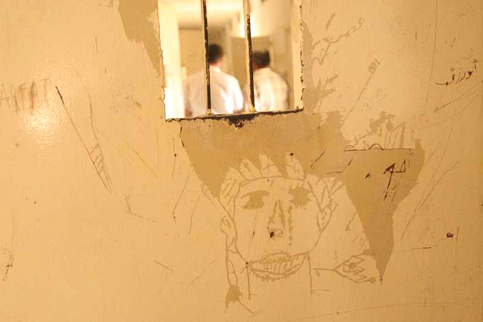Palestine: In prison, who knows why?
- Mohammed Omer, Electronic Intifada, 19 March 2008.

- Photo: Drawings on the wall by Palestinian prisoners.
GAZA CITY: You would think the baby boy named Yousef has his life ahead of him. But who knows, with a child born to Palestinian parents from Gaza. What’s more, Yousef was born in an Israeli prison.
He is the only one of Fatima al-Zeq’s nine children who is with her for that reason — she was arrested nine months ago. But these days the baby is not with her. He developed stomach pain, began to vomit, and has been transferred to a hospital inside Hasharon prison in Israel.
Fatima has written to human rights organizations in Gaza asking for their help in seeing that the baby is looked after, something she cannot do herself.
Her other children do not know why mother is in prison; the Israelis haven’t told them or the Palestinian authorities. And they declined to tell IPS. If anything, the Israelis say the arrests are for “security reasons.”
According to a Palestinian source, she was arrested because Israeli authorities suspected she would carry out an attack in Israel, although no explosives were found on her. Another source suggests that she was arrested because she is a relative of an Islamic Jihad leader.
Fatima had gone to an Israeli hospital to seek treatment, and had a permit for it, her family members say. But at the checkpoint they arrested her and threw her in jail. She joins thousands of Palestinians inside Israeli jails. Prisoners’ families are not always told why they are in prison, whether they have been charged, or convicted, and when, if ever, they will be released.
Seven-year-old Jumana Abu Jazar knows all about this. “My mother died, and I have no brothers and sisters,” she says, looping the string of a picture frame around a rusting nail in her house in Gaza. “Father is in jail in Israel. He lives there in a dark cell. I saw him once.”
Jumana lives with her grandmother Umm Ala’a in the Rafah refugee camp in the southern Gaza Strip. Umm Ala’a says Jumana’s father “was arrested by Israeli occupation forces in 2001 on his way back through the Rafah border. He was accompanying his father, who had received medical treatment abroad. An Israeli judge sentenced him to 18 years in jail.”
Again, the family says that they have no idea what crime he committed. But one thing is clear; he, and so many others arrested, are not being punished for firing rockets into Israel. Nor have most of them carried out what Israel considers terrorist attacks.
“His crime is he was Palestinian,” Umm Ala’a said. “This is a tax on life that we all pay.”
Many Palestinians are convicted on charges never disclosed, but many are in Israeli prisons without ever being charged. Ahmad Abu Haniyah, youth coordinator for the Alternative Information Centre, a 20-year-old project set up jointly by Israeli and Palestinian journalists, was arrested by the Israelis in May 2005. >a href=”http://electronicintifada.net/v2/article6899.shtml”>He was released in May 2007. The Israelis never told him why he was arrested in the first place. He was never charged or tried; the Israelis call this administrative detention.
By now most Palestinian families know a relative or friend who has been held in administrative detention.
Israel occasionally releases batches of prisoners as a “goodwill gesture.” This plays well internationally, but these are usually people close to release date anyway. These gestures benefit few Palestinians, and fools even fewer.
Atia Abu Mussa has been held in the Nafha desert prison for 14 years now; he was detained when he was 21. Every Monday friends and relatives of Atia, along with others, gather outside the office of the International Red Cross in Gaza to hold a vigil for their loved ones.
“My son has been on hunger strike for a week,” says Ramdan al-Baba, standing outside the Red Cross office. “He worked as a guard at [former] president Yasser Arafat’s compound in Ramallah in 2003. His crime was that he had that job.” The conditions in Israeli prison are dire, he said. “I can’t even send him a letter.”
Palestinians find themselves unable to invoke habeas corpus, a provision under the Geneva Convention by which a state must produce information on the whereabouts of a person within its jurisdiction. Israel denies this option on the grounds that it is not necessary for persons under administrative detention. At the moment 863 Palestinians have been in jail for more than 15 years under such detention, according to official Palestinian figures.
There are a total of 10,400 Palestinian prisoners in Israeli jails. These include 90 women and 328 children below the age of 18, according to the Palestinian Ministry of Detainees and Ex-Detainees. Forty-six of the prisoners are members of parliament, mostly members of Hamas.
Israeli human rights groups say that security forces called Shin Bet regularly torture Palestinians in Israeli jails. The two groups B’Tselem and HaMoked: Centre for Defence of Individuals, tracked 73 prisoners between July 2005 and July 2006. They reported that Shin Bet routinely uses “beatings, painful binding, back bending, body stretching and prolonged sleep deprivation” to torture Palestinian prisoners.
All rights reserved, IPS – Inter Press Service (2008).



i am so struck. if i could only walk… im truly sparked to participate in educating these atrocities where i live in ohio… its nice to have an honest account. i APPRECIATE the article!
Commentaire par meg — 31 mars 2008 @ 20:52